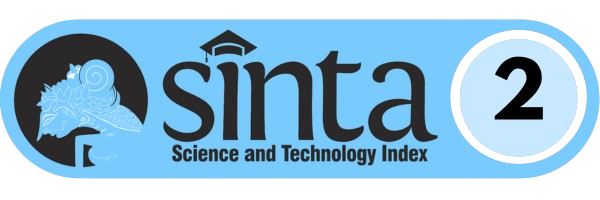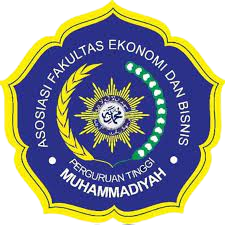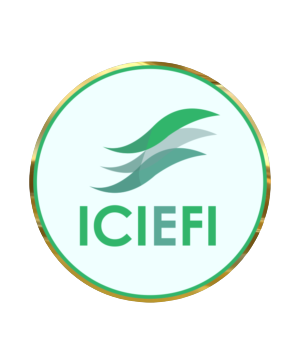Factors Driving Sustainability of Food and Beverage Industries
DOI:
https://doi.org/10.24269/ekuilibrium.v19i2.2024.pp162-171Abstract
This study has two objectives, namely compiling and analyzing vulnerability indexes of business unit, and analyzing key success variables for food and beverage industries after the COVID-19 pandemic. The analysis tool used in this study is business vulnerability analysis. The vulnerability analysis is derived from the vulnerability index to the COVID-19 threat, which is collected from all aspect indicator values of MSMEs' vulnerability to the COVID-19 theeat. These values consist of exposure, sensitivity, and adaptive capacity. The results of the study explain that food and beverage MSMEs are categorized into medium vulnerability to the threat of COVID-19, where sensitivity is the highest influence aspect as a determinant of the vulnerability level. Due in part to the high number of MSMEs that are sensitive to the threat of COVID-19 and lack the ability to adjust, there may have been a fall in sales and bankruptcy of food and beverage MSMEs during the COVID-19 pandemic.
References
Ambrosini, V., & Bowman, C. (2009). What are dynamic capabilities and are they a useful construct in strategic management? International Journal of Management Reviews. https://doi.org/10.1111/j.1468- 2370.2008.00251.x
Badan Pusat Statistika. (2022). Statistik Indonesia 2022 Statistical Yearbook of Indonesia 2022. Statistical Yearbook of Indonesia, April, 192
Brown, Kerry; Jie, Ferry, Le, Thib, Sharafizad, Jalleh; Sharafizad, Fleur; Parida, Subhadarsini. 2022. Factors Impacting SME Business Resilience Post-COVID-19. Sustainability, 2022. 14 (22), art. no. 14850
Chasanah, Faizul, and Hiroyuki Sakakibara. 2021. “Assessment of Social Vulnerability in the Evacuation Process from Mount Merapi: Focusing on People’s Behavior and Mutual Assistance.†IDRiM Journal 10 (2): 15–34. https://doi.org/10.5595/001c.21409.
Collewaert V, Filatotchev I, and Khoury TA. The View of Angels from Above: Angel Governance and Institutional Environments. Academy of Management Perspectives. 2021: 35 (1).
Day GS, and Schoemaker PJH. 2016. Adapting to Fast-Changing Markets and Technologies. California Management Review. 2016;58(4):59-77. doi:10.1525/cmr.2016.58.4.59
Gaffar, V., Tjahjono, B., Abdullah, T., Sari, M., Rofaida, R. 2022. Unfolding the Impacts of a Prolonged COVID-19 Pandemic on the Sustainability of Culinary Tourism: Some Insights from Micro and Small Street Food Vendors. Sustainability (Switzerland), 2022. 14 (1), art. no. 497.
Goel, R. K. 2022. Contributions of creative outputs to economic growth: A disaggregated analysis. Managerial and Decision Economics, 2022.43 (8), pp. 3872-3881.
Hadi, S. 2020. Pengurangan Risiko Pandemik Covid-19 Secara Partisipatif: Suatu Tinjauan Ketahanan Nasional terhadap Bencana. The Indonesian Journal of Development Planning, 2020: IV (2)
Hamze Mousavi, Samira Jalilvand, Shahdokht Sohrabi Sani, Jewell Anne Lee Hartman, Marek Grabowski, 2020. Electronic properties of different configurations of double-strand DNA-Like nanowires, Solid State Communications, Volume 319, 2020, 113974, ISSN 0038-1098, https://doi.org/10.1016/j.ssc.2020.113974.
Isa M, Fauzi A, Susilowati I. 2019a. Flood risk reduction in the northern coast of Central Java Province, Indonesia: An application of stakeholder's analysis. Jà mbá: Journal of Disaster Risk Studies. 2019: 11(1). https://doi.org/ 10.4102/jamba. v11i1.660
Isa, M. Mardalis, A. Mangifera, L. 2019b. Analisis Keputusan Konsumen Dalam Melakukan Pembelian Makanan dan Minuman di Warung Hik. Daya Saing: Jurnal Ekonomi Manajemen Vol. 20, No. 1, Juni 2018
Isa, M., Wajdi, M.F, Mabruroh, Hayati, S.F.N., Kamarulzaman, N.H., 2021. Sustainability of Rice Business in Flood-Prone Areas. Journal of Environmental Research, Engineering and Management Vol. 77 / No. 4 / 2021 pp. 6–18 DOI 10.5755/j01.erem.77.4.28096
Isa, M dan Mangifera, L. (2019). Continuous Flood Risk Reduction on MSMEs: Implementation of Mactor Program. Economic Journal of Emerging Markets, 11(1), 113–121.
Isa, M. & Mardalis, A., 2022, ‘Flood vulnerability and economic valuation of small and medium-sized enterprise owners to enhance sustainability’, Jà mbá: Journal of Disaster Risk Studies 14(1), a1306. https://doi.org/10.4102/ jamba.v14i1.1306
Kamalipoor, M., Akbari, M., Hejazi, S.R., Nazarian, A. 2022. The vulnerability of technology-based business during COVID-19: an indicator-based conceptual framework. Journal of Business and Industrial Marketing 2022. DOI: 10.1108/JBIM-10-2020-0455
Kato, M. & Charoenrat, T., 2018, ‘Business continuity management of small and medium sized enterprises: Evidence from Thailand’, International Journal of Disaster Risk Reduction 27, 577–587. https://doi.org/10.1016/j. ijdrr.2017.10.002
Kuncoro, Tri Wisnu Dono Kuncoro. 2023. The Impact of the Covid-19 Pandemic on the Capacity of MSMEs, IKM, Informal Sector Traders in Surakarta City (Dampak Pandemi Covid-19 pada Kapasitas UMKM, IKM, Pedagang Sektor Informal Kota Surakarta). Jurnal Bengawan Solo: Pusat Kajian Penelitian dan Pengembangan Daerah Kota Surakarta Vol.1, No.1 Juni 2022 e-ISSN: 2963-5462; p-ISSN: 2963-5462, Hal 115-133
Mafruhah I, Supriyono, Mulyani NS, Istiqomah N. Causality Between Tourism Industry Development and the Ecological Sustainability in Marine Environment: A Convergence and Divergence among Stakeholder with Mactor Analysis. International Journal of Energy Economics and Policy, 2020: 10(4)
Mangifera, L., & Mawardi, W. (2022). Digital Transformation and Its Impact on Financial Performance: in the Food and Beverage Small Business Sector. 49–61.
Marsiwi, D., Winanto, A. R., & Purwanto. (2020). Characteristics and Problematics of SMEs in Ponorogo. Ekuilibrium: Jurnal Ilmiah Bidang Ilmu Ekonomi, 15(1), 91–102. https://doi.org/10.24269/ekuilibrium.v15i1.%25y.pp91-102
Neise, T. & Revilla Diez, J., 2019, ‘Adapt, move or surrender? Manufacturing firms’ routines and dynamic capabilities on flood risk reduction in coastal cities of Indonesia’, International Journal of Disaster Risk Reduction 33, 332–342. https:// doi.org/10.1016/j.ijdrr.2018.10.018
Otengei, S.O, and Ahebwa, W.M. 2021. Innovative capacity and sustainable food tourist influx to African-ethnic restaurants: The dynamic capabilities perspective. Tourism and Hospitality Research, 2021-21 (2), pp. 131-143
Planinc, Tanjaa, Kukanja, Marko, ZnidarÅ¡iÄ, Anja. 2022. The Interplay of Restaurant SMEs' Entrepreneurial and Environmental Characteristics, Management of the Requisite Assets, and Operational Efficiency. Organizacija, 2022.55 (2), pp. 160-177.
Portillo-Tarragona P, Scarpellini S, Moneva JM, Valero-Gil J, Aranda-Usón A. Classification and measurement of the firms’ resources and capabilities applied to ecoinnovation projects from a Resource Based view perspective. Sustainability (Switzerland). 2018: 10(9).
Pramudyastuti, O. L., Iswanaji C., Setyawan, S., Atika, Simamora A.J., 2023 Sustainable Business Model in Small and Medium-Sized Enterprises: A Study in Yogyakarta and Magelang. Ekuilibrium: Jurnal Ilmiah Bidang Ilmu Ekonomi Vol. 18, No. 2: September, pp. 213-226
Prastian, G.A., Setiawan, A., Bachtiar, N.K, 2022. SMES’ sustainability: between business resilience and business growth, which one is more significant in the time of crisis? Jurnal Manajemen Bisnis Vol. 9, No. 1 (2022) March, Page. 94-105
Purnomo, B. R., Adiguna, R., Widodo, Suyatna, H., Nusantoro, B.P. 2021. Entrepreneurial resilience during the Covid-19 pandemic: navigating survival, continuity and growth. Journal of Entrepreneurship in Emerging Economies, 2021. 13 (4), pp. 497-524.
Purwati, A.A., Budiyanto, Suhermin. 2021. Innovation capability as a mediation in the relationship of social capital and entrepreneurial leadership behavior on the performance of culinary and hospitality sectors' SMEs in Pekanbaru, Indonesia. (2021) Economic Annals-XXI, 193 (9-10), pp. 92-998
Rahadhini, M.D., Choerudin, A., Kustijana, D.H. 2021. Behavioural Intention In Consuming Culinary (Study On Tourism Industry In Solo - Indonesia). Journal of Legal, Ethical and Regulatory Issues, 24 (Special Issue 1), pp. 1-12.
Schreyögg, G., and Martina, K (2007). How dynamic can organizational capabilities be? Towards a dual-process model of capability dynamization. Strategic Management Journal, 28, 913-933.
Setiyawan, A. and Isa, M. 2022. Business Success Factors of Halal Food and Beverage Entrepreneurs in Surakarta. ICBAE. EAI. DOI: 10.4108/eai.10-8-2022.2320771
Tambunan, T.T.H. (2009). SMEs in Asian Developing Countries. New York: Palgrave Macmillan.
Tanaka, Hajime, Nagisa Shiiba, and Michael C. Huang. 2021. “Tsunami Impact Assessment and Vulnerability Index Development Using Computable General Equilibrium (CGE) Model and Geographic Information System (GIS) – A Study on Mie Prefecture, Japan.†IDRiM Journal 11 (1): 46–63. https://doi.org/10.5595/001c.28384.
Tatiana, Andreeva.and Ritala, P. 2016 What are the sources of capability dynamism? Reconceptualizing dynamic capabilities from the perspective of organizational change Baltic Journal of Management, Vol. 11 Issue: 3, pp. 238-259
Teece, David. J., Gary Pisano, and Amy Shuen, Amy. 1997. “Dynamic capabilities and strategic management.†Strategic Management Journal 18: 509-533.
Wajdi MF, Isa M, Mangifera L. The Analysis of Business Vulnerability in Rice Supply Chain in the Flood Prone Areas. TEST Engineering & Managemen 2020 (82)
Wang, Y., and Shi, X. (2011). Thrive, not just survive: Enhance dynamic capabilities of SMEs through IS competence. Journal of Systems and Information Technology,13(2), 200–222.
Weis, S.W., Agostini, V.N., Roth, L.M., Gilmer, B., Schill, S.R., Knowles, J.E., et al., 2016, ‘Assessing vulnerability: An integrated approach for mapping adaptive, sensitivity, and exposure’, Climate Change 136, 615–629. https://doi. org/10.1007/s10584-016-1642-0
Yuniarty, So, I.G., Abdinagoro, S.B., Hamsal, M. 2021. Sustaining the innovation performance of e-business smes through digital eco-dynamic to survive in the covid-19 pandemic. Proceedings of 2021 International Conference on Information Management and Technology, ICIMTech 2021, pp. 761-766
Yue, Audrey, 2022. Conjunctions of resilience and the Covid-19 crisis of the creative cultural industries. International Journal of Cultural Studies, 2022. 25 (3-4), pp. 349-368.
Downloads
Published
How to Cite
Issue
Section
License
Retained Rights/Terms and Conditions of Publication
1. As an author you (or your employer or institution) may do the following:
- make copies (print or electronic) of the article for your own personal use, including for your own classroom teaching use;
- make copies and distribute such copies (including through e-mail) of the article to research colleagues, for the personal use by such colleagues (but not commercially or systematically, e.g. via an e-mail list or list server);
- present the article at a meeting or conference and to distribute copies of the article to the delegates attending such meeting;
- for your employer, if the article is a ‘work for hire’, made within the scope of your employment, your employer may use all or part of the information in the article for other intra-company use (e.g. training);
- retain patent and trademark rights and rights to any process, procedure, or article of manufacture described in the article;
- include the article in full or in part in a thesis or dissertation (provided that this is not to be published commercially);
- use the article or any part thereof in a printed compilation of your works, such as collected writings or lecture notes (subsequent to publication of the article in the journal); and prepare other derivative works, to extend the article into book-length form, or to otherwise re-use portions or excerpts in other works, with full acknowledgement of its original publication in the journal;
- may reproduce or authorize others to reproduce the article, material extracted from the article, or derivative works for the author's personal use or for company use, provided that the source and the copyright notice are indicated, the copies are not used in any way that implies RCEPM-LIPI endorsement of a product or service of any employer, and the copies themselves are not offered for sale.
All copies, print or electronic, or other use of the paper or article must include the appropriate bibliographic citation for the article's publication in the journal.
2. Requests from third parties
Although authors are permitted to re-use all or portions of the article in other works, this does not include granting third-party requests for reprinting, republishing, or other types of re-use. Requests for all uses not included above, including the authorization of third parties to reproduce or otherwise use all or part of the article.
3. Author Online Use
- Personal Servers. Authors and/or their employers shall have the right to post the accepted version of articles pre-print version of the article, or revised personal version of the final text of the article (to reflect changes made in the peer review and editing process) on their own personal servers or the servers of their institutions or employers without permission from Universitas Muhamamdiyah Ponorogo, provided that the posted version includes a prominently displayed Universitas Muhamamdiyah Ponorogo copyright notice and, when published, a full citation to the original publication, including a link to the article abstract in the journal homepage. Authors shall not post the final, published versions of their papers;
- Classroom or Internal Training Use. An author is expressly permitted to post any portion of the accepted version of his/her own articles on the author's personal web site or the servers of the author's institution or company in connection with the author's teaching, training, or work responsibilities, provided that the appropriate copyright, credit, and reuse notices appear prominently with the posted material. Examples of permitted uses are lecture materials, course packs, e-reserves, conference presentations, or in-house training courses;
- Electronic Preprints. Before submitting an article to an Ekuilibrium: Jurnal Ilmiah Bidang Ilmu Ekonomi, authors frequently post their manuscripts to their own web site, their employer's site, or to another server that invites constructive comment from colleagues. Upon submission of an article to Ekuilibrium: Jurnal Ilmiah Bidang Ilmu Ekonomi, an author is required to transfer copyright in the article to Economy Faculty Universitas Muhammadiyah Ponorogo, and the author must update any previously posted version of the article with a prominently displayed Economy Faculty Universitas Muhammadiyah Ponorogo copyright notice. Upon publication of an article by the Universitas Muhammadiyah Ponorogo, the author must replace any previously posted electronic versions of the article with either (1) the full citation to the work with a Digital Object Identifier (DOI) or link to the article abstract in Ekuilibrium: Jurnal Ilmiah Bidang Ilmu Ekonomi journal homepage, or (2) the accepted version only (not the final, published version), including the Economy Faculty Universitas Muhammadiyah Ponorogo copyright notice and full citation, with a link to the final, published article in journal homepage.
4. Articles in Press (AiP) service
Economy Faculty Universitas Muhammadiyah Ponorogo may choose to publish an abstract or portions of the paper before we publish it in the journal. Please contact our Production department immediately if you do not want us to make any such prior publication for any reason, including disclosure of a patentable invention.
5. Author/Employer Rights
If you are employed and prepared the article on a subject within the scope of your employment, the copyright in the article belongs to your employer as a work-for-hire. In that case, Economy Faculty Universitas Muhammadiyah Ponorogo assumes that when you sign this Form, you are authorized to do so by your employer and that your employer has consented to the transfer of copyright, to the representation and warranty of publication rights, and to all other terms and conditions of this Form. If such authorization and consent has not been given to you, an authorized representative of your employer should sign this Form as the Author.
6. RCEPM-LIPI Copyright Ownership
It is the formal policy of Economy Faculty Universitas Muhammadiyah Ponorogo to own the copyrights to all copyrightable material in its technical publications and to the individual contributions contained therein, in order to protect the interests of the Economy Faculty Universitas Muhammadiyah Ponorogo, its authors and their employers, and, at the same time, to facilitate the appropriate re-use of this material by others. Economy Faculty Universitas Muhammadiyah Ponorogo distributes its technical publications throughout the world and does so by various means such as hard copy, microfiche, microfilm, and electronic media. It also abstracts and may translate its publications, and articles contained therein, for inclusion in various compendiums, collective works, databases and similar publication.
7. Licensing Terms
Ekuilibrium is licensed under a Creative Commons Attribution-ShareAlike 4.0 International License.
Permissions beyond the scope of this license may be available at https://journal.umpo.ac.id/











